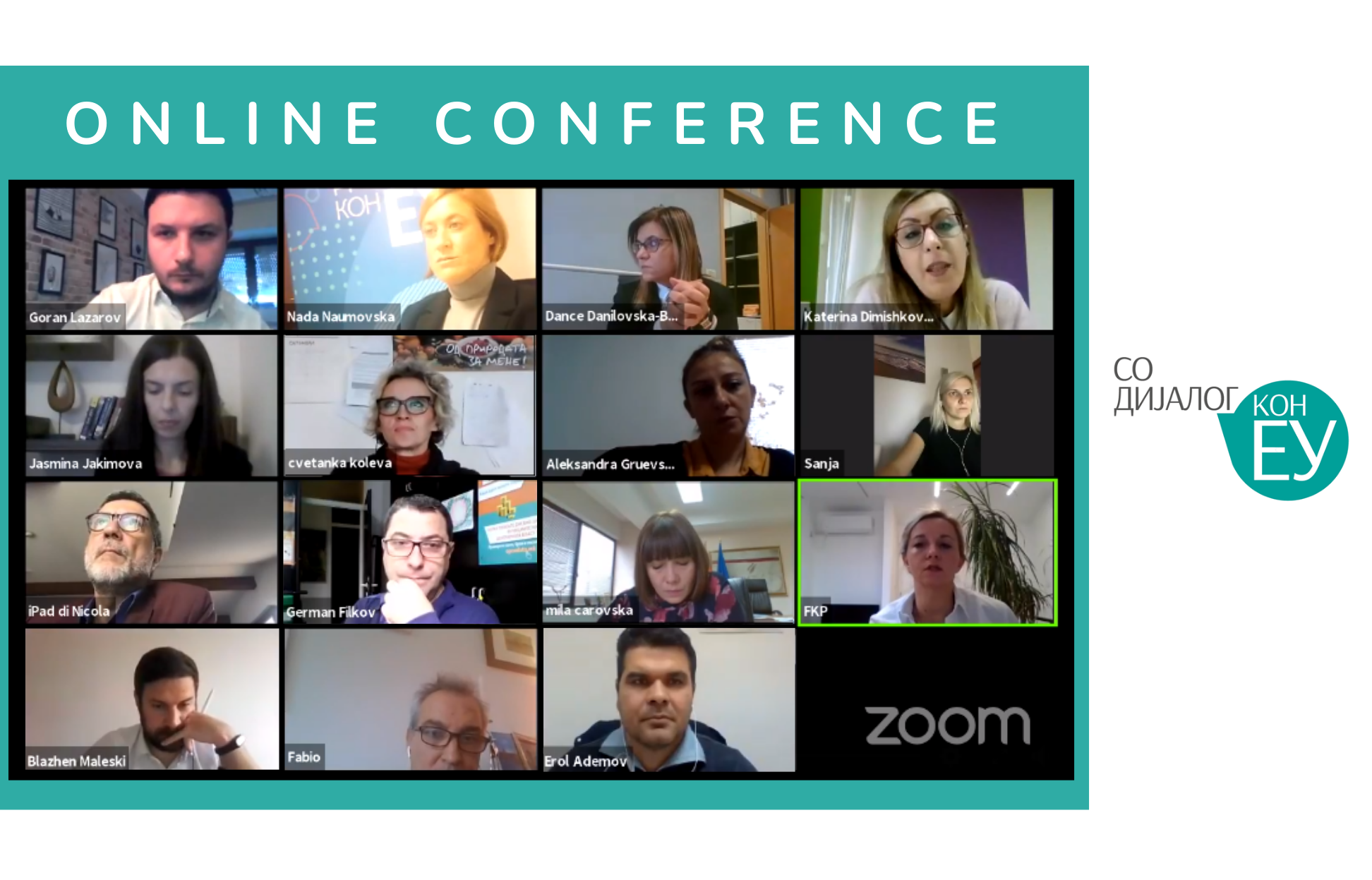On December 9, 2020, an online conference was held with more than sixty representatives from the civil society, state institutions and the media, to discuss the perspectives of sector working groups and future EU negotiations, and included a presentation of the first “Shadow Report from Monitoring Work and Effects of the Sector Working Group on Education, Employment and Social Policy in the Period January 2019 – February 2020”.
The first panel was opened by Nada Naumovska, Senior Program Coordinator at the Foundation Open Society – Macedonia, who provided an overview of the methodology applied for development of shadow reports for all 12 sector working groups and underlined the most important recommendations aimed at improving the quality of their work and performance.
Executive Director of the Foundation Open Society – Macedonia, Fani Karanfilova-Panovska, stressed that, under the EU accession process, civil society organizations need to actively participate in programming, implementing and monitoring relevant policies and processes. Based on interviews conducted and focus groups organized in respect to civil society representativeness in work of sector groups, Karanfilova-Panovska emphasized that it could be concluded that, at the moment, there is no mechanism in place that could ensure structured and organized participation of the civil society and that an adequate model is missing in respect to selection of civil society representatives in sector working groups. Hence, the project “CSO Dialogue” will strive to revise the model for selection of civil society representatives.
Nikola Bertolini, Head of the Cooperation Sector at the EU Delegation, indicated that sector working groups represent a forum of stakeholders, citizens, institutions, civil society organizations, private sector, donor community, etc., to discuss and adopt necessary reforms and that the Republic of North Macedonia has successfully implemented this process, becoming a leader in the region. At the same time, he indicated that sector working groups represent a cultural revolution in the society that would enable a cultural change in the state.
Kalinka Gaber, State Secretary at the Secretariat for European Affairs, reported that sector working groups were introduced under IPA II and although currently there are no specific information available at EU level, it is certain that the sector-wide approach will also continue under IPA III, because serious steps forward have been made and because this approach has proved successful as multiannual strategic framework for programming EU assistance in compliance with priorities set by the state. At the same time, she indicated that, in the last period, these sector groups were more focused on coordination of IPA programming, but that the situation we are currently facing, i.e. inability to reach a consensual decision to open accession negotiations, has opened a chance for sector working groups to be more involved in discussion and design of sector-wide policies under the EU integration process.
The second panel was opened by the Minister of Education and Science, Mila Carovska, who indicated that the biggest problem faced by sector working groups is lack of feedback which civil society representatives in sector groups should share with other civil society actors that work on given topics. At the same time, greater feedback is expected and necessary in respect to work performed by civil society representatives that are members of sector working groups.
Blazhen Maleski, Researcher at Reactor – Research in Action, presented findings from the Shadow Report from Monitoring Work and Effects of the Sector Working Group on Education, Employment and Social Policy, indicating that this sector group is well set-up and has a basis of good practices that could be used for further development of the sector-wide approach. Namely, civil society organizations are given space to make their contributions, although that was made difficult in the monitored period due to short deadlines in which relevant documents had been shared. Additionally, both line ministries competent for this sector group (MES and MLSP) could reconsider use of this forum to discuss a broader scope of policies, having in mind that policies discussed during the monitored period concerned only those related to use of IPA funds and coordination with international donors. The gender perspective was part of these policies, but there is still space for further improvements, especially in respect to education. Therefore, good practices need to be continuously upgraded, civil society organizations should become a more active factor in this type of forums, and the sector-wide approach should be promoted with a view to cover consultations for more policies, from the very start of their development.
This conference is organized as part of the project “CSO Dialogue – Platform for Structural Participation in EU Integrations”, coordinated and implemented by the Foundation Open Society – Macedonia, in partnership with Reactor – Research in Action, Eurothink – Center for European Strategies and Center for Civil Communications.
A video recording of the event is available on this link.
Shadow Report from Monitoring Work and Effects of the Sector Working Group on Education, Employment and Social Policy is available for download on this link.
